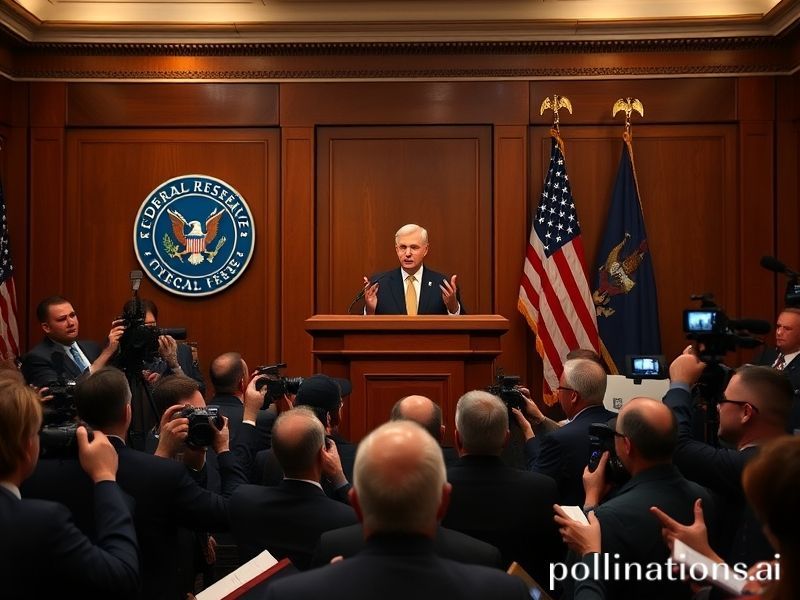Powell Speaks, World Listens: The Global Hangover After the Fed’s Latest Sermon
When Jerome Powell cleared his throat in Washington last week, Tokyo traders paused mid-slurp on their 3 a.m. ramen, Frankfurt algorithms twitched in their sleep, and a bleary-eyed pension fund manager in São Paulo muttered a prayer to St. Jude—the patron saint of lost yields. The Fed Chair’s semi-annual testimony before Congress was billed as routine, yet the planet treated it like the season finale of humanity’s least favorite reality show: “Monetary Policy and the City.”
Global markets, ever the drama queens, had spent weeks rehearsing panic. Emerging-market central banks pre-hiked rates so they could claim “pre-emptive tightening” when the inevitable tantrum arrived. Even the Swiss National Bank—normally as emotive as a cuckoo clock—briefly considered issuing a press release, then thought better of it and went back to polishing gold bars.
Powell’s message, stripped of its Fedspeak upholstery, was the rhetorical equivalent of a polite bouncer: inflation is still too drunk to drive, so rates will stay higher for longer, but please don’t make us throw anyone out the window. Translation for non-economists: the punch bowl remains locked behind the bar; if you want liquidity, drink your own tears.
Cue synchronized swooning across continents. The yen, already flirting with 150 to the dollar, swooned like a Victorian heroine. The European Central Bank, hand pressed to its forehead, warned of “second-round effects”—central-banker jargon for “this headache is contagious.” Down in Cape Town, the Reserve Bank governor tried to look stoic while calculating how many more rate hikes it takes to make a South African avocado toast unaffordable. (Answer: one and a half.)
China, never one to waste a Western crisis, let the yuan drift lower and instructed state media to run stories about the virtues of domestic consumption. Somewhere in Beijing, a mid-level cadre updated the PowerPoint slide titled “Why Belt-and-Road Debtors Should Thank Us for Dollar Stress.” The irony, of course, is that China’s own property sector is being kept alive by fiscal adrenaline drips, but geopolitical optics demand a stiff upper lip—even if the lip is trembling.
Across the Atlantic, the Bank of England’s Andrew Bailey performed the ceremonial shrug, reminding Britons that imported inflation is “outside our control,” which is central-banker for “blame Putin and the weather.” Sterling wobbled anyway, because traders long ago learned never to trust an institution that once lost an entire gilt market to a pension-fund margin call.
Meanwhile, the Global South watched the spectacle with the weary amusement of a bartender watching trust-fund kids argue over the last olive. Countries with dollar-denominated debt—roughly half the planet—saw their repayment schedules stretch into geological time. Ghana, already restructuring like a yoga instructor on espresso, politely asked the Fed to consider the “externalities” of its domestic mandate. Powell, ensconced in marble and mahogany, nodded sympathetically and then raised the terminal rate forecast by 25 basis points.
The broader significance? In a world addicted to cheap dollars, the dealer just reminded everyone that rehab is non-negotiable. Climate finance, tech unicorns, and your cousin’s NFT start-up all face the same grim detox. Even the International Monetary Fund—historically the lender of last resort—has started sounding like a wellness influencer: “Have you tried sustainable fiscal adjustment and drinking more local currency?”
Yet humanity being humanity, the minute inflation drops a decimal point, the same chorus will clamor for rate cuts faster than you can say “moral hazard.” Until then, we remain trapped in the Fed’s waiting room, paging through outdated magazines titled “Transitory Forever” and “This Time Is Different Quarterly.”
Conclusion: Powell’s speech was never about the words; it was about the reminder that the dollar is still the planet’s reserve currency, the Fed its reluctant landlord, and the rest of us tenants praying the rent doesn’t go up again. The global economy may be a carnival of contradictions, but the ticket price is always quoted in green. And the bouncer, courteous yet implacable, has made it clear: last call was yesterday, and the tab is coming due.







